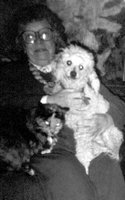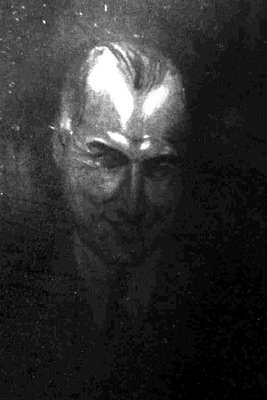A Life of War

Jacquelinne at home
with two of her friends
My father lived through WW1. He was in the British trenches that famous Christmas when the Germans, in their own trenches only yards away, threw sausages over to the British and the British sent them back plum puddings. Daddy was one of the men who danced on no-man's-land that Christmas Eve. Young and beautiful German men and the young and beautiful Canadians and other British men danced together until each side was called back and told to continue trying to kill one another. My father lived long enough in the trenches to see the hands of the men they had buried in the walls fling off the dirt and stretch out those hands so their still- alive fellow soldiers could shake them going by and send them greetings. He lived through being buried alive for three days, buried under the earth piled up by a bursting bomb. His fellow soldiers found him when there was a "lull", still breathing, talking but not responding to them. Over and over he said," It is Wednesday to-day. It is Wednesday to-day." He had been buried on a Wednesday and tried to keep his sanity by repeating that sentence.
It was one of the first sentences I ever heard and only partially understood. My sisters were one and two years younger than I. We, too young to fully understand, realized Daddy sat down and gripped the arms of his chair when he was under stress. So when we were sad or disappointed we too sat in our chairs, our small chairs, grabbed the seat beneath our bottoms and repeated, "It is Wednesday to-day." We were of course corrected by the maids, our mother, and our much older siblings. When we were a little older and had been trained not express ourselves in that manner we would still hear Daddy so we would hit him on his hands or his knees and say, "No, Daddy. It is not Wednesday," and he would come out of his trance. We did that all through our childhood and our teens and our early twenties, until we left home, and even when we came back to visit we sometimes brought him back to the present by tapping him, stroking his head, being more gentle than we had been as children when we did not fully understand.
He "talked to himself," but it was not really talking to himself. He talked to Alfie. He always said the same thing. " Your mother is coming Alfie. It is going to be fine. Your mother is coming." I questioned him about that when I was perhaps three years old. We lived on a Cree Indian reserve in Saskatchewan. It was a short walk from our home to his office. The walk was on a narrow dirt path through a little poplar woods, beside a willow-rimmed pond, across a little meadow, over a style into the cow yard, across that yard and through a gate to his office in the middle of another meadow. I used to follow, every chance I got, padding along silently behind him, listening to him. I always turned back just before the style because I was afraid of the milling cows. One day when we were almost to the style I startled him by asking, " Who is Alfie?" We sat down on the steps of the style and he told me about Alfie. Nothing he told me made much sense to me but I pondered and I remembered. Before he started he said something about it not being necessary to tell Momma. We were used to having secrets from our mother and we understood why. There might be trouble if she knew our secrets. He then told me about Alfie. He said, "Jacquelinne, he was only sixteen years old. He was wounded and going to die and he kept calling for his mother. He was only sixteen. I thought it would comfort him to think his mother was coming. He was only sixteen when he died, Jacquelinne."
At the age of three or four I could not comprehend sixteen years. Sixteen seemed very very old, maybe about the same as ninety. I think I must have been in my middle teens before I properly understood. Alfie had slipped by the recruiters and had been sent to the trenches with men eighteen years old.
It seems to me I have always known war. I was nineteen in September 1939. Still young when Korea came along. Not old during the Vietnam war, fearful they would draft my grandson in the Gulf War. Now there is war again and others living through the horrors and even worse than the generations before them, unspeakable though those wars were.
Thousands and thousands all over the world are marching and protesting but I also hear people saying, " Turn off the news. Do not think about it. We cannot do anything so why think about it." I have no response for them. I do not criticize them. But it is in me to remember and to cry out. I need to paint it, to write it as artists and writers for all time have done. Guernica. On two magazine covers, The New Yorker and Harpers. Picasso's Guernica. We remember the Spanish artist of 200 hundred years ago who was so explicit in what war looked like. I am so grieved I cannot bring up his name. Most of you know his name I am sure and I too shall in a few moments. I am too stunned to think clearly.
The man's name was Goya. Remember the woman with a bayonet, with a baby in her arms. Remember her victim.
Daddy told another tale: He was sitting, alone, under the only tree left in what had been a small wood. The tree was shorn of leaves, blasted off by the same ammunition that had felled the other trees. It was moonlight. A nightingale flew over and dropped onto one of few branches left on the tree, threw back its head and sang to him.
"Daddy," from a painting by Jacquelline













No comments:
Post a Comment